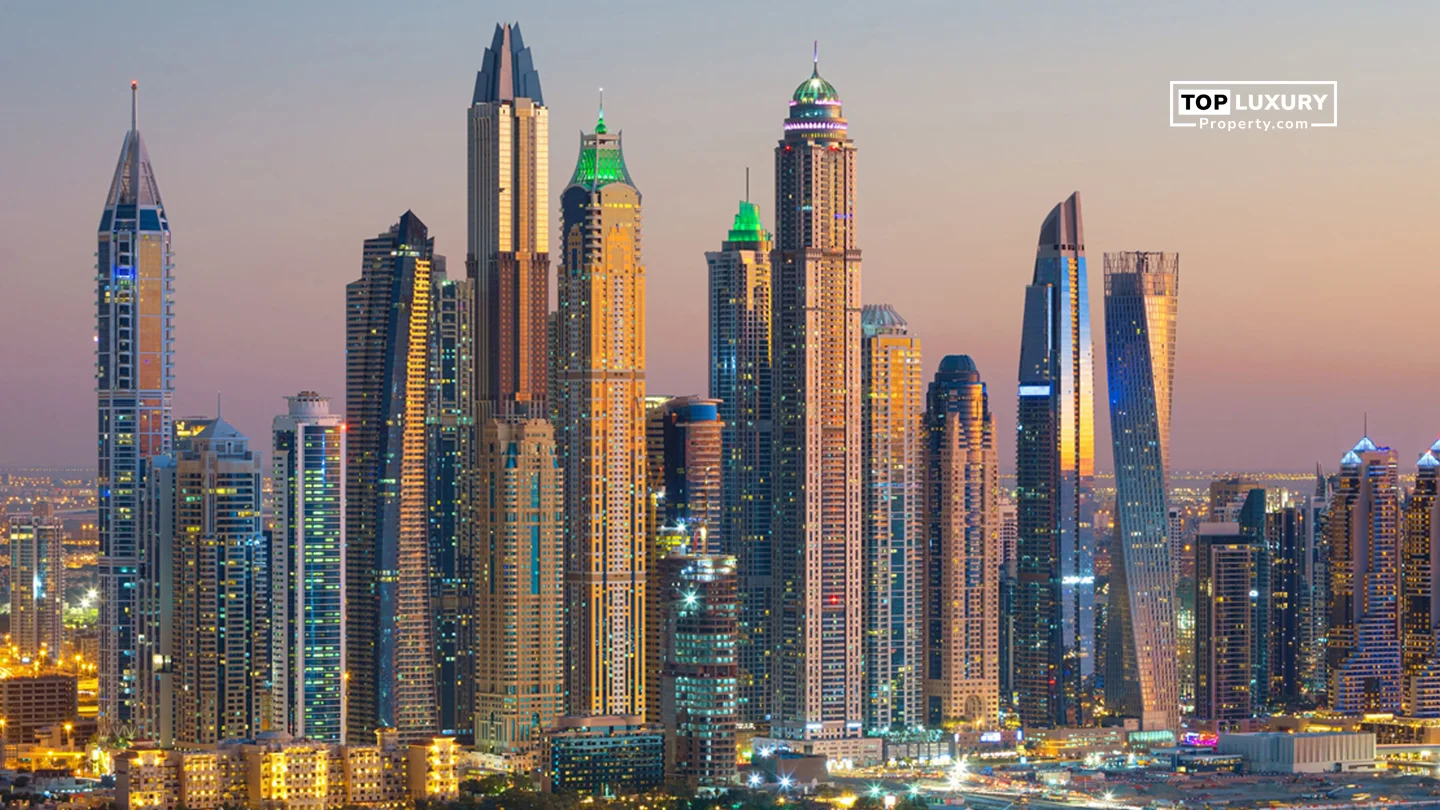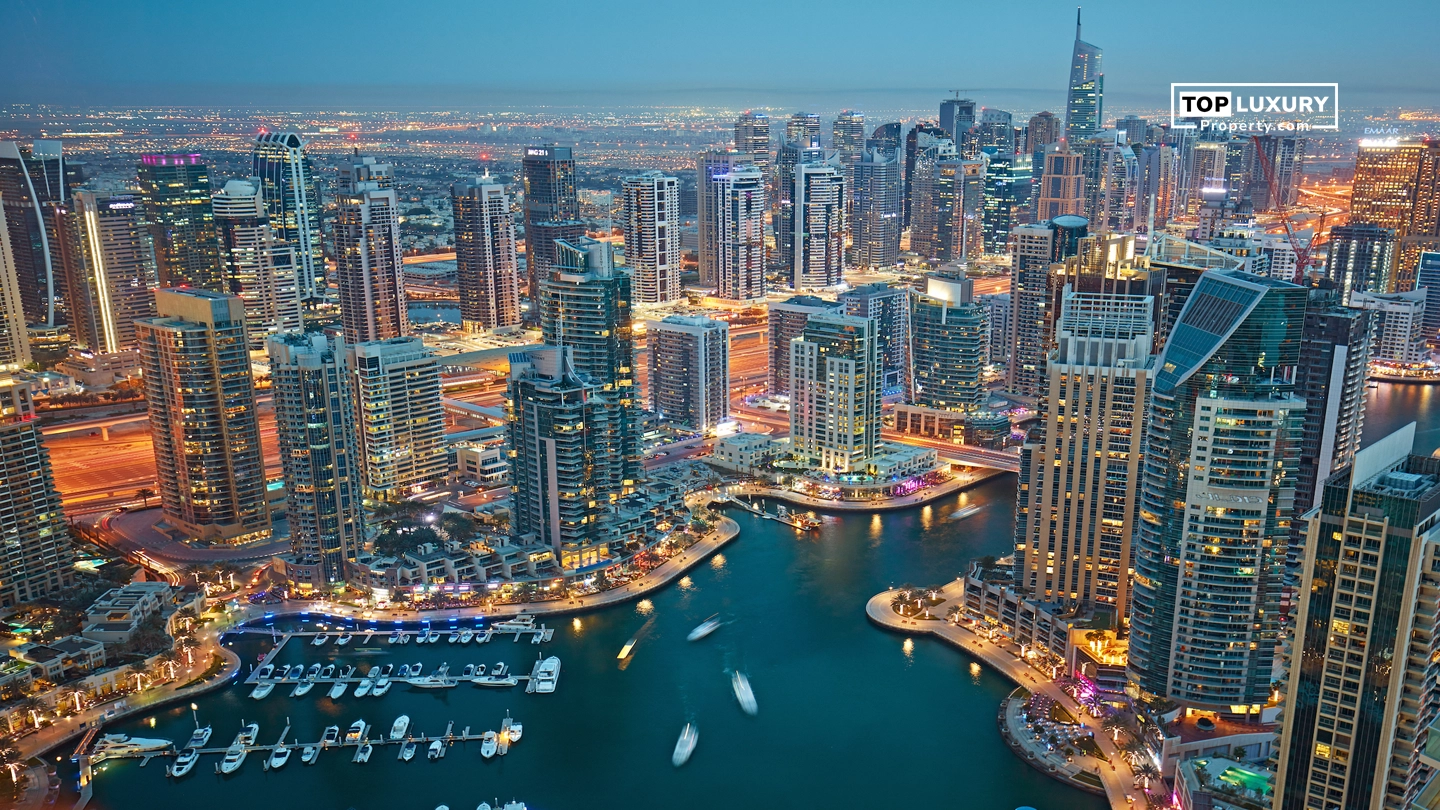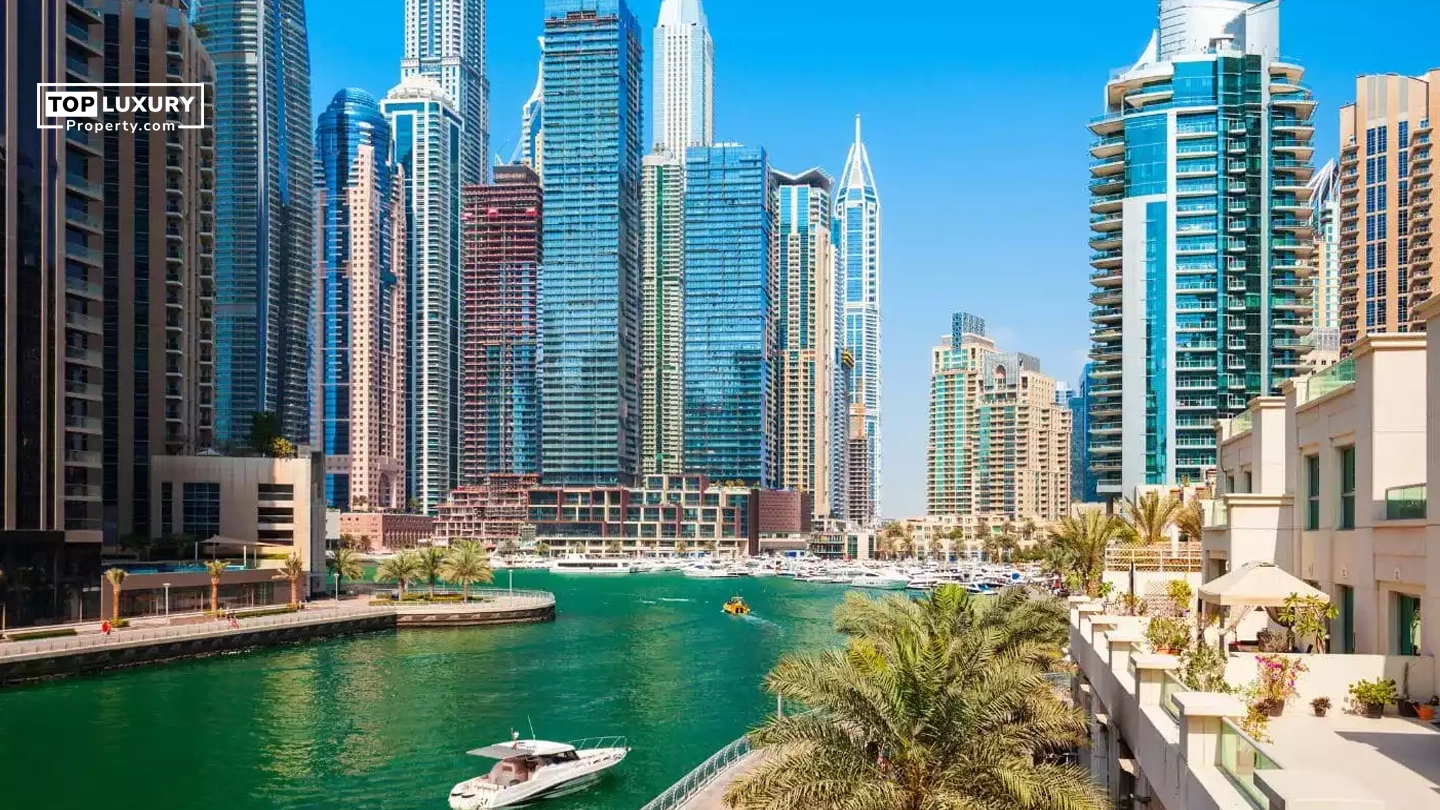Dubai Property Market has emerged as a highly dynamic and investor friendly zone in the modern world. Dubai changed in the past 20 years turning a trading point in the desert into a world center of finance development, tourism market and luxurious living, and real estate has been at the center of that process.
In 2002, foreigners already had the permission to purchase freehold property and since that time, the market is evolving as an organized and secure ecosystem with accessibility to legal protection and transparency. Under the supervision of the Dubai Land Department (DLD) and the Real Estate Regulatory Agency (RERA), the modern market is characterized by the high investor protection, digitalization of various operations, and high demand among the locals and foreign investors.
What attracts the most in Dubai real estate is that they offer tax-free returns, residence privileges, and a high manufacturing infrastructure. Dubai can be a good choice whether you consider investing in off-plan projects, purchasing a ready apartment, or owning a luxury villa with the sea view because it is the place that can suit all budgets and strategies.
Some of the main features of the Dubai Property Market relate to:
Freehold Access: Totally open to foreigners in special freehold regions and allowed as actual property owners.
Zero Taxes: Both property taxes and capital gains tax are zero and there is unequalled ROI.
Diverse Inventory: Various kinds of properties such as studio apartments, penthouses, villas and branded residences.
Stable Environment: Sound political and economic environment and robust legal cover to buyers.
Digital Services: Online services, like Ejari registration, issuance of title deeds, and DLD verification applications.
The real estate in Dubai is not simply a kind of investment; it is a form of life, residence solution, and an insurance against uncertainty of the global scene.
Key Factors Driving Property Prices in Dubai
Before fully getting the secrets of the Dubai Property Market, it is paramount that you get to understand issues that determine the prices of properties in the city. The real estate values in Dubai are not moving unpredictably but reacting to certain economic, infrastructural and policy related stimuli. It is possible to understand all these factors and then appropriately time investments in properties and select locations having the greatest appreciation prospects.
The major drivers towards Property investment Dubai prices in 2025 and beyond are given below:
1. Vision 2030 Government Policies
The governance of Dubai keeps on implementing reforms in order to make it appealing to investors around the world. The direct positive effect has included Golden Visas to property owners, long term residency and the digital nomad programs, all of which have contributed to an increase in demand in the real estate sector. Buyer interest is being redefined through such major projects under Vision 2030 as formation of smart cities, development of the new city zones, etc.
2. Infrastructure & mega projects
There are also new metro lines, touristic sites such as the Museum of the Future, waterfront projects such as Dubai Creek Harbour, which generate the attraction of property value increase. The near area property values appreciate at a rate of 10–20 percent above the norm.
3. Demand by Foreign Investors
Rich European, Asian and Middle Eastern citizens are attracted by political neutrality, good taxation and living standards. There is also an upward pressure on the prices due to increased interest by institutional investors and second homes seekers.
4. Supply vs. Demand Cycle
Despite the fact that Dubai is known as the fast construction city, there is an instance whereby the high-demand communities are reflected by the buyer population rather than the construction units. It causes an imbalance in the prices in areas such as Dubai Marina, Downtown, Jumeirah Village Circle, thus increasing the price.
5. International Macro-economic Trends
Dubai has become a wealth preservation destination due to currency strength, inflation in other countries, and high interest in safe haven investments.
Best Areas for Property Investment in 2026
Dubai Property Market is a young market and we are now approaching 2026, what investors are seeking are the new areas of high growth which will include capital growth, high rental yields, and a long-term potential. This is unlike the past years when purchasing in any of the areas of Dubai would have given the investor profits yet today wise investors examine location-specific growth patterns, future infrastructure and the lifestyle aspect before investing in it.
In 2026, Property investment Dubai is favorable in the following aspects: the distance to the main construction, the demand of investors, the launch of the project, the rental accommodation, and community infrastructure. Assets in these areas are supposed to perform better owing to the rising demand by the end-users and the tenants.
These are the best communities to look in 2026:
Dubai Creek Harbour: This Emaar mega development set by the waterfront will be called the new Downtown; it is going to be made an architectural icon. Dubai Creek Harbour boasts of luxury, nature and the city with the almost tallest tower and the closeness to the wildlife sanctuaries.
Damac Riverside: Expecting to be one of the most popular master-planned communities in Dubai. Damac Riverside is located along the Dubai Water Canal will consist of villas and townhouses with comfortable green landscapes, smart-home technologies, and nearby schools and shopping. Good option to families and long-term investors.
Emaar South: This neighborhood is also close to the potential legacy site of the Expo 2020 as well as Al Maktoum Airport and is fast increasing in value. Set to become the logistics hub of Dubai in the future, Emaar South is ideal towards capital growth in the next 5–10 years.
Business Bay: Business Bay also retains corporate renters as well as end-users with the launch of new projects and luxury branded residential properties. It is perfect when it comes to renting it in the short-term and long-term due to its close location to the Downtown and Dubai Canal.
Jumeirah Village Circles (JVC): A popular one among cost-conscious investors. Jumeirah Village Circles still poses as a good choice to follow a buy-to-let strategy, having high rental returns (6–8%), and quick resale optionality.
The Dubailand Valley: With central Dubai becoming overcrowded, The Valley and adjacent regions of the Dubailand are fantastic mid-income investment destinations as they offer cheap family housing with decent outdoor parks, colleges, and recreational fields.
Consider these when investing:
Rental Yield: A potential to earn on the rent (seek 6 and above percentages yearly)
Infrastructural Plans: The area has long term infrastructural plans.
Developer Quality: High quality developer presence
Vacancy Rates: Empty rates and community timeline of completion
Legal Essentials for Buying Property in Dubai
The legal system used in the Dubai Property Market is very crucial to new and experienced investors. Dubai has entrenched a transparent and well-regulated legal regime, which encourages foreign ownership of properties on specific freehold zones. Nevertheless, familiarity with legal proceedings, reporting, and expectations will make your deal safe and legal.
These are the legal fundamentals to be aware of by any purchaser in detail:
Ownership of Freehold Vs. Leasehold
Freehold: Gives ownership of the property and the land on which the property is constructed. Foreigners can play in special areas.
Leasehold: Title held over a specified term (usually 30 to 99 years), upon expiry of the period the freeholder becomes the owner.
Make sure that you ascertain what kind of property this is and ensure you know your rights to it.
Buyer Eligibility
There is no residency before one can purchase property.
Purchasers need to be 21+ and have an identification (passport or Emirates ID).
International buyers need to ensure that the place is foreigner friendly, i.e., it is a freehold zone that is licensed to foreigners.
Agreement to Purchase Price and Deposit
As soon as a price will be negotiated:
Memorandum of understanding (Form F) is signed between the buyer and the seller.The real estate agent or a trustee takes into custody a down-payment of 10%.
DLD Registration
Any transactions should be registered to DLD who issues Title Deed.
There is a 4% cost of DLD (based on the value of purchase) to be paid by the purchaser.
The other levies are advisor office fees (approx. AED 4,000) along with admin cost.
There is also no need of a local sponsor
Their advantage compared to establishing a business is the fact that foreign nationals are allowed to own 100 percent of the property in their name without having a local partner or sponsor.
Ready Properties off-Plan
Off-Plan: The developer must be DLD-approved, and that they are registered in Oqood.
Ready Property: Settled Property will have other service charges, maintenance dues that should be confirmed before settling.
Legal pointers to go through smooth transaction:
Go to RERA-licensed agents at all times.
Authenticate developers with DLD apps or repositories.
All the documents to be signed should be bilingual (Arabic-English), and signed, in presence of an authorized trustee.
By being acquainted with the legal structure, you will feel secure and will not leave your property investment at risk of fraud, delays, or legal issues in Dubai.
Hidden Costs Buyers Should Watch Out For
The headline price of a house may be affordable but unfortunately, hidden expenses may make the overall sum of money you pay very high in the Dubai Property Market. It is also very typical of first-time buyers to miss such extra costs, which are in fact important in planning budgets and investing. Failure to acknowledge such charges may cause unforeseen purchases of stress and even a delay of the transaction.
These expenses are not limited to the actual cost of the property but can also incorporate governmental expenses, commissions by the agencies, registration fees, and maintenance fees among other administrative expenses. Knowing them and anticipating them will prevent surprises and will make sure that you will make a winning investment in the long term.
Still, the most popular hidden costs may be outlined in the following way:
Registration Fees: Dubai Land Department (DLD) Fees is a government fee payable on registration of all property and usually amounts to 4 percent of the property.
Real Estate Agent Commission: It is an amount charged by the agent of the sale of the property sold, usually about 2 percent of the purchase price.
Wood Fee (Off Plan): About an amount of AED 5,250 to register off-plan property in the name of a buyer.
Trustee Office Fee: It varies between 2,000–4,000 AED depending on the value of the property.
No Objection Certificate (NOC): A fee paid to the developer upon the purchasing of a property in the secondary market; may be AED 500–5,000.
Service Charges: Developer or community maintenance fees that are billed annually by the developer or community management that are average AED 10–25/per sq. ft.
Mortgage related Costs: This includes registration mortgage (0.25% of loan amount), valuation (approximately AED 2,500), and processing of mortgage.
DEWA Connection: The Dubai Electricity and Water Authority policy will require new customers to pay roughly an amount between AED 2,000–AED 4,000 in order to start services.
Furnishing & Moving: This also differs between a purchased unit which is fully-furnished or a shell unit.
Mandatory Home Insurance: Although not a requirement, it is highly encouraged to take a home insurance policy, and even more required in case you are taking a mortgage.
Tips for Negotiating the Best Property Deals
The real estate market in Dubai is a regulated one, nevertheless, there is a negotiation scope—resale or off plan properties. Having the proper footing in negotiations will enable you to place a better price on the item or better payment terms or even more added benefits such as free fee or interior fittings.
Regardless of whether you are concerned with a developer or with individual selling, strategic advice outlined below should assist you in getting the most value:
Market Trends: Based on research, find out what prices are currently going in the locality to know whether the selling price is fair or over-inflating.
Have No Fear to Walk Away: Dealers tend to give better prices when they feel that you can move on to someone or otherwise.
Best Use Multiple Choice: Inform the agent that you are keeping other properties in consideration. This makes you have a bargaining chip.
Ask to Add: Request no increase in price to add appliances, furnishing or even parking space.
Negotiate Payment Plan (Off-plan): When being serious buyers, developers are also willing to change the payment systems, the demand can be an extension, or payment after hand over.
Make a Smart Agent Your Partner: A competent real estate agent will understand where to dig his heels and in which way to negotiate the bargain on your side.
Identify Motivated Sellers: There are sellers that are in time pressure and are ready to give hefty discounts in exchange for speedy closures.
Independent Valuation Reports: Having Independent Valuation Reports done may assist with your counter offer in the case of an overpriced property.
Verify Unsold Stock: In case a developer is attempting to get rid of unsold units you are better placed to bargain.
Financing Options for Dubai Property Purchases
Before placing a definitive order to purchase the real estate in Dubai, it is important to learn about the available *real estate financing options. Whether you’re a resident or an international investor, Dubai offers a diverse range of financing channels that cater to different buyer profiles — from Sharia-compliant mortgages to flexible developer installment plans.
These are the most popular financing options of 2026 in detail:
Financing with Islamic Bank
How is it interesting?
This Sharia-compliant option avoids interest-based lending and instead operates on profit-based schemes. Ideal for Muslim investors or those seeking ethical financing.
Modes include Ijara (rent-to-own), Murabaha (cost-plus sale), and Musharaka (partnership)
Long-term commitment with fixed monthly payments
Structured around profit margins, not interest
Old-fashioned Home Loans
What is appealing about it?
Traditional mortgages from top banks are available to residents and eligible non-residents. A popular route to owning a home in Dubai.
First-time buyers can receive loan-to-value (LTV) ratios of up to 80%
Loan tenure ranges between 5 to 25 years
Requires fixed income, good credit history, and documented employment
Developer Financing
What is alluring about it?
Developers often provide direct payment plans, especially for off-plan properties. This simplifies financing by avoiding banks.
Down payments start at just 10–20%
Post-handover payment terms of up to 3–5 years
No mortgage processing or registration fees
Personal Loans
Why is it appealing?
Not ideal for full property purchase, but suitable for down payments or smaller upfront costs.
Quick access to funds
Shorter repayment terms but higher interest rates
Limited to smaller sums (typically AED 300,000–500,000)
Joint and Co-owner Loans
Why is it attractive?
Joint loans allow couples, families, or business partners to pool their income and purchase more valuable property.
Combined income helps increase borrowing power
Shared property titles and co-liability for repayments
Home Equity Release
Why is it appealing?
If you already own a property in Dubai, you can leverage its equity to fund a new purchase.
Raise capital by mortgaging an existing property
Effective for investors expanding their portfolio
Subject to bank approval and property valuation
The Role of Freehold vs. Leasehold Properties
One of the most critical decisions in the Dubai Property Market is choosing between freehold and leasehold ownership. Both come with distinct rights, restrictions, and long-term implications—especially for expats and first-time buyers.
Freehold properties grant full ownership of both the unit and the land it occupies. Owners are free to sell, rent, or transfer the asset. Freehold zones include areas like Dubai Marina, Downtown Dubai, Palm Jumeirah, and Business Bay.
In contrast, leasehold properties provide the right to use and occupy the property for a defined period (typically 10–99 years), but not the land itself. They may have lower initial costs but come with limitations on renovations, resale, and renewal.
What is the significance of the difference?
The type of ownership influences resale value, visa eligibility, and long-term investment stability.
Freehold Ownership:
Full land and property rights
Available to foreigners in designated areas
Potential eligibility for long-term Golden Visa
Greater freedom in resale and rental
Leasehold Ownership:
Rights to use the property for a specific period (usually 99 years)
Lower initial purchase price
Restrictions on structural modifications
Renewal negotiations upon lease expiry
Market Trends to Watch in Dubai’s Real Estate
The Dubai real estate market has witnessed explosive growth over the past decade. Looking toward 2026, several key trends are expected to shape investment strategies and property values. These trends are influenced by global economic factors, local regulations, population dynamics, and ambitious infrastructure projects.
Why is it worth watching?
Aligning your investment decisions with these trends can help maximize ROI and reduce long-term risk.
Prominent Trends in 2026:
Rise of Off-Plan Sales:
Surging pre-completions in Dubai South, JVC, and Sobha Hartland
Popular with younger investors due to lower entry prices and flexible payment plans
Luxury Market Expansion:
Strong performance in Palm Jumeirah, Emirates Hills, and Downtown Dubai
High-net-worth individuals are gravitating toward branded residences (e.g., Bulgari, Cavalli, Ritz-Carlton)
Sustainable & Smart Communities:
Growing demand for eco-conscious homes with solar panels and smart systems
Communities like The Sustainable City and Expo Valley are gaining popularity
Suburban Migration:
Families are opting for gated communities like Arabian Ranches, DAMAC Hills, and Mira
Larger spaces, better facilities, and quieter environments drive demand
Increased Foreign Investment:
Boosted by visa reforms, tax-free environment, and high rental yields
Strong interest from European, Asian, and GCC investors
Common Mistakes First-Time Buyers Should Avoid
Buying property in Dubai can be thrilling, but it also comes with risks—especially for first-time buyers. A lack of research or planning can lead to legal complications, missed expenses, or unwise investments.
Many new investors focus only on aesthetics or expected returns, ignoring legal aspects, hidden charges, and broader market dynamics.
So why is this important? Avoiding these pitfalls ensures that your investment is profitable, compliant, and aligned with your long-term goals.
Things not to do:
Skipping Legal Due Diligence:
Failing to verify developer registration, DLD approvals, or project status
Always use RERA-approved agents and legal experts
Misunderstanding Ownership Types:
- Not grasping the difference between freehold and leasehold rights
Ignoring Total Cost of Ownership:
- Overlooking DLD fees, maintenance costs, and service charges
Emotional Buying:
- Falling for design or view, without checking location, demand, and long-term value
Overleveraging Through Financing:
- Taking on excessive mortgage debt without planning for vacancy periods and rate fluctuations
Lack of Exit Strategy:
- No plan for when to sell, how to manage the property, or handle post-sale logistics







